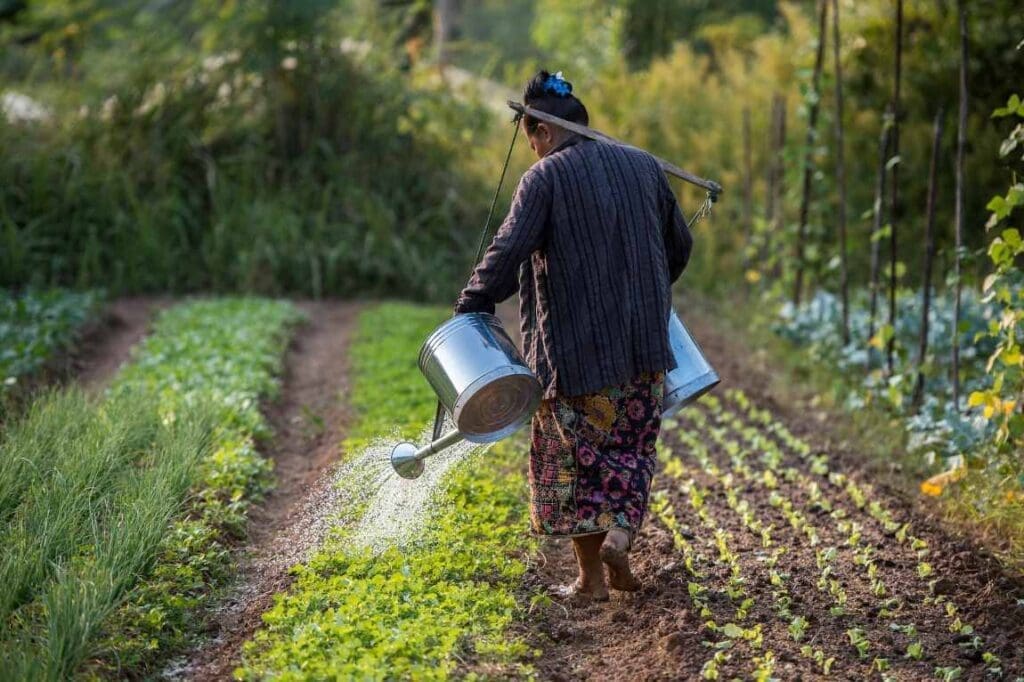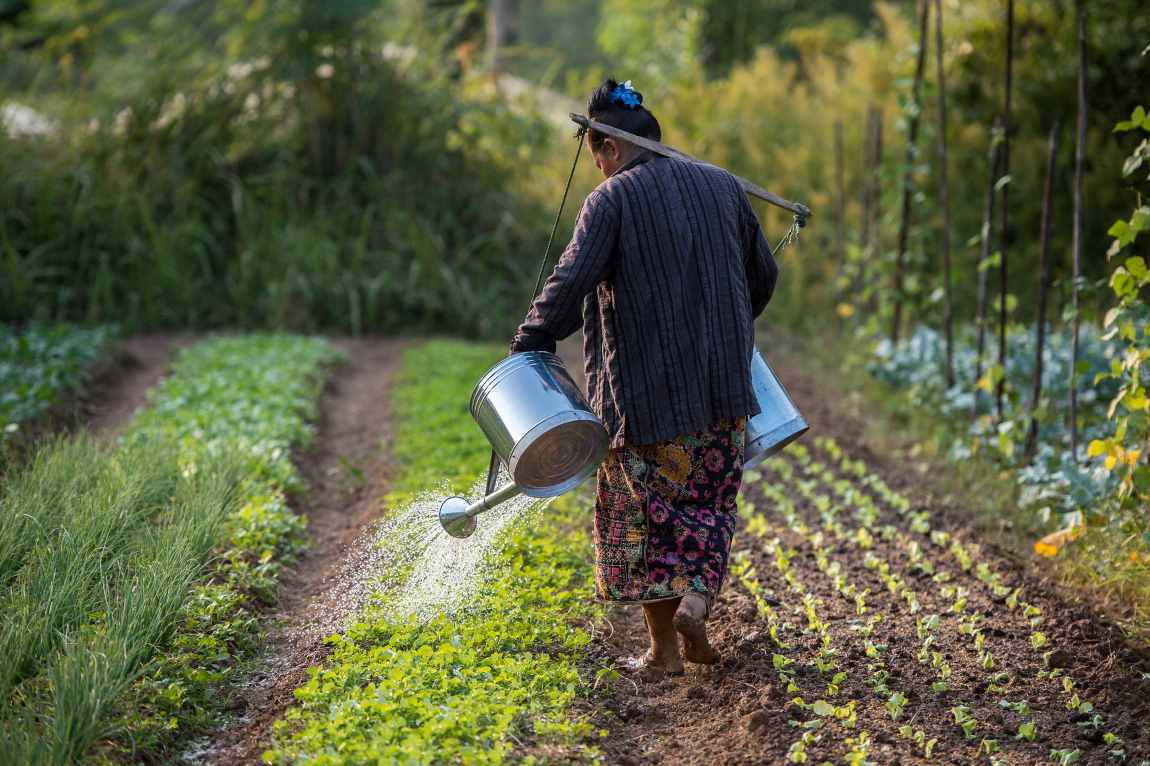
Recognising the leadership role of women is essential to addressing climate change across the Indo-Pacific.
Women play a critical but often overlooked role in the transition to net-zero carbon emissions.
As the world grapples with the need to shift away from fossil fuels, the urgency of confronting climate change is an imperative for governments worldwide.
But in many communities across the Indo-Pacific, there is an imbalance for women between sustainable progress and gender equality.
Women do much of the hard work but have little say when it comes to strategy and decision-making.
The lack of recognition limits their access to essential resources such as land ownership, agricultural extension services and leadership opportunities, exacerbating harmful gender inequalities.
This means decision makers do not learn from their women’s innovations, reducing opportunities to address the climate crisis.
For example, women actively contribute to improving food security in their communities. As traditional knowledge holders of ecosystems, they are at the forefront of adaptation and climate resilience, actively participating in agrifood systems and the green economy.
Their engagement spans many kinds of work – agriculture, soil management, water harvesting and livestock management, which all directly aid food security for their communities. Their knowledge is a critical resource.
With COP29 getting underway and Gender Day taking place on November 21, there is a need for decision-makers to go beyond dialogue that merely highlights the need for gender-responsive action and to identify solutions that can meaningfully tackle the barriers hindering women’s participation and recognition in climate initiatives.
As stipulated by the UN Framework Convention on Climate Change, the World Health Organization and the UN Human Rights Council, this transition must be equitable, upholding the rights of vulnerable populations, particularly across the Global South, who are disproportionately affected by the climate crisis.
Human rights concerns are increasingly prominent in Conference of the Parties (COP) discussions.
Women and girls are often the most vulnerable to climate impacts. This is particularly true in the Indo-Pacific, where women are disproportionately affected by the socio-economic impacts of natural disasters, such as more frequent and intense cyclones, sea-level rise, rising temperatures and loss of food sources.
Following the two tropical cyclones that hit Vanuatu within three days in March 2023, up to 90 percent of crops were destroyed in some provinces, contributing to food scarcity and rising food prices.
Ni-Vanuatu women had to replant their gardens to sell produce at the market, raising funds to rebuild houses lost in the cyclones and to feed children and elderly relatives.
Women are also more likely to suffer violence in the wake of disasters. Following the tropical cyclones in Vanuatu in 2011, rates of reported domestic violence increased by 300 percent.
Despite the disproportionate impacts on women, including decreased access to education and increased gender-based violence, systemic barriers hinder their leadership and voice in the transition to sustainability, as well as access to resources.
This marginalises their essential contributions to climate resilience and sustainable development, and the protection of women and girls in policy and action.
In the face of these challenges, many women are nonetheless leading sustainable transitions across the region, often in subversive, unpaid and grassroots ways, although this is not widely seen or financially recognised – counter to the principles of a just transition, which emphasise inclusivity and leaving no one behind.
Women’s vital role in just transitions
Female employment in agriculture across the Indo-Pacific region accounts for more than half the total labour force. In some countries, such as Laos, women make up more than 70 percent of the rural agricultural labour force, followed by 45 percent in Myanmar and 41 percent in Vietnam.
Beyond agriculture, women are increasingly involved in renewable energy transitions, with many working in small-scale solar and biomass energy projects that support local and rural economies, reducing dependence on fossil fuels and mitigating the impacts of environmental changes on food production and water supplies.
Yet women’s labour is often undervalued and unrecognised by governments. Their work is often viewed as an extension of unpaid care responsibilities. This includes essential caregiving roles within households, such as child care, elderly care and disability care, which are routinely overlooked and uncompensated.
Addressing these issues is crucial, as highlighted in the COP28 agenda, which emphasised the need for gender-responsive approaches to climate action, including learning from lived experience and local innovation.
Gender Action Plan at COP28
The Gender Responsive Just Transitions Climate Action Partnership, launched last year at COP28 and endorsed by 82 member states, marks a significant step towards integrating gender-responsive approaches into climate action. It emphasises that women’s leadership, participation and access to financial and social protections are key to ensuring equitable transitions that uplift entire communities.
However, global reports, such as those by UN Women, ASEAN Gender Outlook 2024 and the Food and Agriculture Organization, reveal that women are underrepresented in policy and leadership positions across sectors critical to just transitions.
Furthermore, gender-responsive climate negotiations and policy discussions can be fraught; delegates were unable to conclude discussions at the 2024 Bonn Conference, with limited commitment to gender equality demonstrated among some parties.
In the Pacific, women have played a major role in climate adaptation and a low-carbon economy, particularly with the male workforce being diverted to Australia and New Zealand as part of the Pacific Australia Labour Scheme (PALM) and the Recognised Seasonal Employer Scheme in New Zealand (RSE).
In Vanuatu, women’s networks were mobilised in the lead-up to and aftermath the 2023 twin cyclones – for example, through a women-led early warning and disaster response messaging system which alerted up to 40 percent of the population; and the widespread distribution of 17 tonnes of local food crops from resilience gardens that had been harvested by women across communities.
Indonesia’s Just Energy Transition Partnership framework, for instance, outlines a pathway for transitioning to renewable energy and highlights the importance of inclusivity, including a focus on addressing gender equality.
While fast-growing economies like Indonesia are making serious commitments in mainstreaming gender in just transitions, the framework does not yet encompass the tangible measures to address and support women’s leadership, decision-making and recognise their labour, or address the systemic barriers they face, both economically and socially.
From commitments to action
Recognising women’s role at the forefront of just transitions and as agents of community resilience, means prioritising women’s leadership in decision-making processes and acknowledging their critical contributions to driving sustainable change, particularly as many of their livelihoods are tied to renewable and green jobs.
Women-led initiatives such as the Women I Tok Tok Tugeta (WITTT) Network in Vanuatu, one of the most climate-vulnerable countries in the world, leverages local knowledge and expertise to enhance community resilience against climate change.
By empowering women to take leadership roles in climate adaptation and mitigation strategies, the WITTT Network fosters sustainable practices, ensures that women’s voices are prioritised in decision-making processes, and promotes the implementation of effective solutions to address challenges faced by their communities, including preventing gender-based violence, improving disability rights, disaster management and safeguarding community health.
Additionally, with a focus on gender-responsive solutions, governments need to recognise women for their unpaid and largely unseen contributions by addressing women’s care role and compensating for time poverty, prioritising their access to financial and social protection programmes such as cash-plus programmes and climate insurance.
These programmes could enable women to access the resources and platforms needed to meaningfully engage in labour markets and decision making, while balancing caregiving responsibilities and sustainability leadership roles in our region.
***
About authors
Assistant Professor Gabriela Fernando, based at Monash University, Indonesia, specialises in Global Health. Her research focuses on the intersections of women’s health and equity, gender equality, climate change and health, and poverty, with an emphasis on South and Southeast Asia.
Ms Jessica Walters is a Palawa woman and Project Coordinator of the Citarum Action Research Program (CARP) at the Monash Sustainable Development Institute. Personally involved in the agriculture, forestry and aquaculture industries, her research is at the intersection of earth and social sciences, focusing on the impacts of a changing climate on local communities.
Associate Professor Susie Ho is the Academic Director in the Office of the Deputy Vice-Chancellor (Student Experience) and the Designated Contact Point for the UNFCCC at Monash University. Her research explores the intersection of sustainability education and employability, aiming to cultivate future strategic leaders capable of driving social and environmental impact.
Dr. Sarah Gosper is the Deputy Director of the Global Immersion Guarantee Program at Monash University. Her research focuses on gender and international development, with a particular emphasis on gender-based violence in the Asia-Pacific and masculinities in China.
Originally published under Creative Commons by 360info™.
Article Source:
Press Release/Material by Gabriela Fernando, Jessica Walters, Susie Ho, Sarah Gosper | Monash University, Indonesia and Monash University, Australia | 360info
Featured image: In some Indo-Pacific countries, such as Laos, women make up more than 70 percent of the rural agricultural labour force. ‘Smallholder Development Project in Lao PDR’. Credit: Ariel Javellana/ADB | Flickr | CC BY-NC-ND




